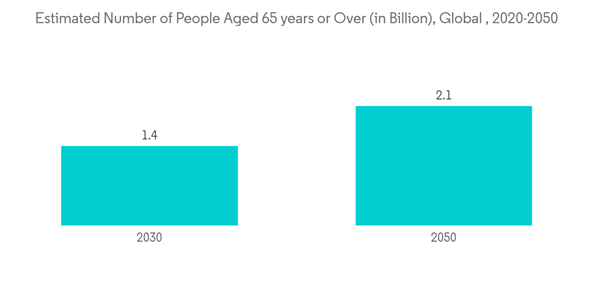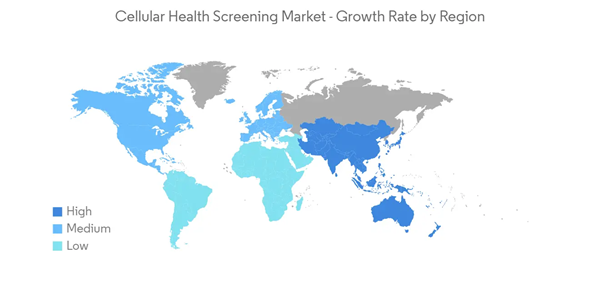COVID-19 has had a significant impact on the growth of the market over the study period. The rise in preventive health awareness among the global population during the pandemic drives the growth of the market. According to the NCBI article published in June 2022, the most common tests performed in the past 12 months were 83% of blood pressure measurements, 66.2% of blood sugar, 53.1% of urinalysis, and 55.1% of liquid panel. The high number of preventive health screenings during the pandemic is expected to contribute to the growth of the market. In addition, the demand for cellular health screening is expected to remain undisturbed during the post-pandemic period owing to the rising preference for preventive healthcare, thereby contributing to the growth of the market over the coming five years.
The growth of the market is attributed to rising applications of cellular health screening in personalized medicine and increasing government focus on preventive healthcare. The potential applications of cellular health screening in personalized medicine have provided significant growth opportunities to market players in this field. Along with the rapidly growing geriatric population, the demand for cellular screening is expected to rise during the forecast period. According to the World Health Organization Report in October 2021, by 2030, one of every six people on the planet will be 60 years old or older. The number of people aged 60 and up is expected to rise from 1 billion in 2020 to 1.4 billion by 2050. By 2050, the global population of people aged 60 and up will have doubled (2.1 billion). Between 2020 and 2050, the number of people aged 80 and up is expected to triple, reaching 426 million. The growing geriatric population is more prone to chronic diseases, and thus, this increases the demand for preventive diagnostics, particularly cellular health screening.
Furthermore, the rising chronic illness burden and increasing awareness regarding cellular biomarkers are expected to contribute to the growth of the market. According to the Globocan 2020 fact sheet, an estimated 19,292,789 new cancer cases were diagnosed globally. Additionally, according to estimates from the International Agency for Research on Cancer (IARC), by 2040, the global burden of cancers is expected to increase to 27.5 million new cancer cases worldwide. Such an increase in chronic diseases, such as cancer, is expected to drive the demand for cellular health screening owing to the demand for effective and early diagnosis, thereby contributing to the growth of the market over the forecast period.
Thus, the above-mentioned factors are expected to drive the growth of the market over the forecast period. However, the risks associated with the transport of samples are expected to restrain the growth during the forecast period.
Cellular Health Screening Market Trends
Telomere Tests Segment is Expected to Hold Significant Market Share Over the Forecast Period
The telomere test segment is expected to dominate the market. It accounts for a larger share of the cellular health screening market as these panels are used to get more accurate information and help perform cellular health screening tests to measure the length of the telomere, thereby preventing diseases. Furthermore, with the rising geriatric population, the preference for telomere tests is expected to rise as it facilitates individuals to check their cellular age and thereby take preventive measures, contributing to the growth of the market.According to the Frontiers research study published in January 2021, telomere had been the most widely used molecular biomarker of aging. Innovative approaches, such as single-cell telomere measurement techniques aimed at the identification of critically short telomeres and DNA methylation-based methods of telomere length estimation, were being developed to improve sensitivity, repeatability, and throughputs of methods used for determining telomere lengths. Such uses of telomere-based tests and developments of improved sensitivity telomere tests are expected to contribute to the growth of the segment over the forecast period.
The rise in the market player's activities, such as product launches, in order to meet the growing demand for telomere tests is expected to contribute to the growth of the segment. For instance, in August 2021, TruDiagnostics released a new report expansion for TruAge, its epigenetic testing service. This expansion gives an accurate estimation of telomere length based on methylation. Thus, the above-mentioned factors are expected to contribute to the growth of the segment over the forecast period.
North America is Expected to Dominate the Cellular Health Screening Market Over the Forecast Period
North America is expected to hold a significant share of the cellular health screening market owing to a high patient pool and rising disease prevalence.According to Globocon 2020, new cancer cases were diagnosed in 2,281,658 in the United States in 2020. Among all cancers, breast cancer had the highest incidence rate, with 253,465 cases, followed by lung (227,875), prostate (209,512), and colon (101,809). Also, the data published by the American Cancer Society in 2022 estimated that a total of 1.9 million new cancer cases would occur in the United States in 2022. Such increasing incidence of chronic diseases among the population is expected to drive the demand for cellular health screening owing to the effective and early diagnosis, thereby contributing to the growth of the market.
In addition, the Centres for Disease Control and Prevention (CDC) data updated in July 2022 showed that coronary heart disease was the most common type of heart disease, and approximately 20.1 million adults of age 20 and older had the disease in the United States. Per the CDC data in October 2022, every 40 seconds, someone suffers from a heart attack, and nearly 805,000 people in the United States have a heart attack every year. Thus, the high burden of cardiovascular diseases demands the availability of cellular health screening for early diagnosis, driving the market's growth.
Cellular Health Screening Market Competitor Analysis
The cellular health screening market is fragmented due to the presence of several companies operating globally as well as regionally. Some of the global players include Bio-Reference Laboratories Inc., Genova Diagnostics, Immundiagnostik AG, Quest Diagnostics, SpectraCell Laboratories Inc., and Telomere Diagnostics Inc., among others.Additional benefits of purchasing the report:
- The market estimate (ME) sheet in Excel format
- 3 months of analyst support
This product will be delivered within 2 business days.
Table of Contents
Companies Mentioned (Partial List)
A selection of companies mentioned in this report includes, but is not limited to:
- Bio-Reference Laboratories, Inc. (OPKO Health)
- Genova Diagnostics
- Immundiagnostik AG
- Laboratory Corporation of America Holdings
- Quest Diagnostics
- Segterra Inc.
- SpectraCell Laboratories Inc.
- Telomere Diagnostics Inc.










